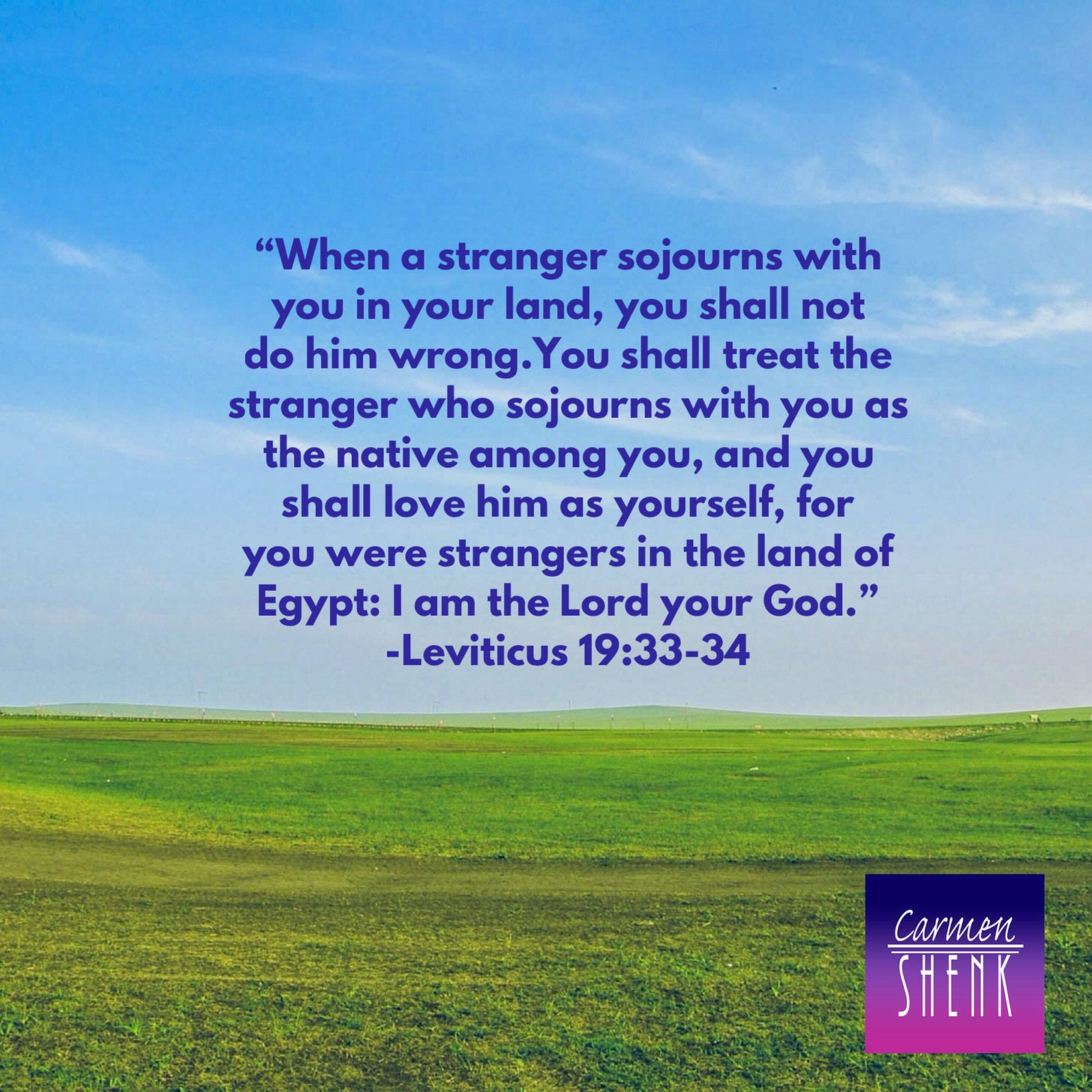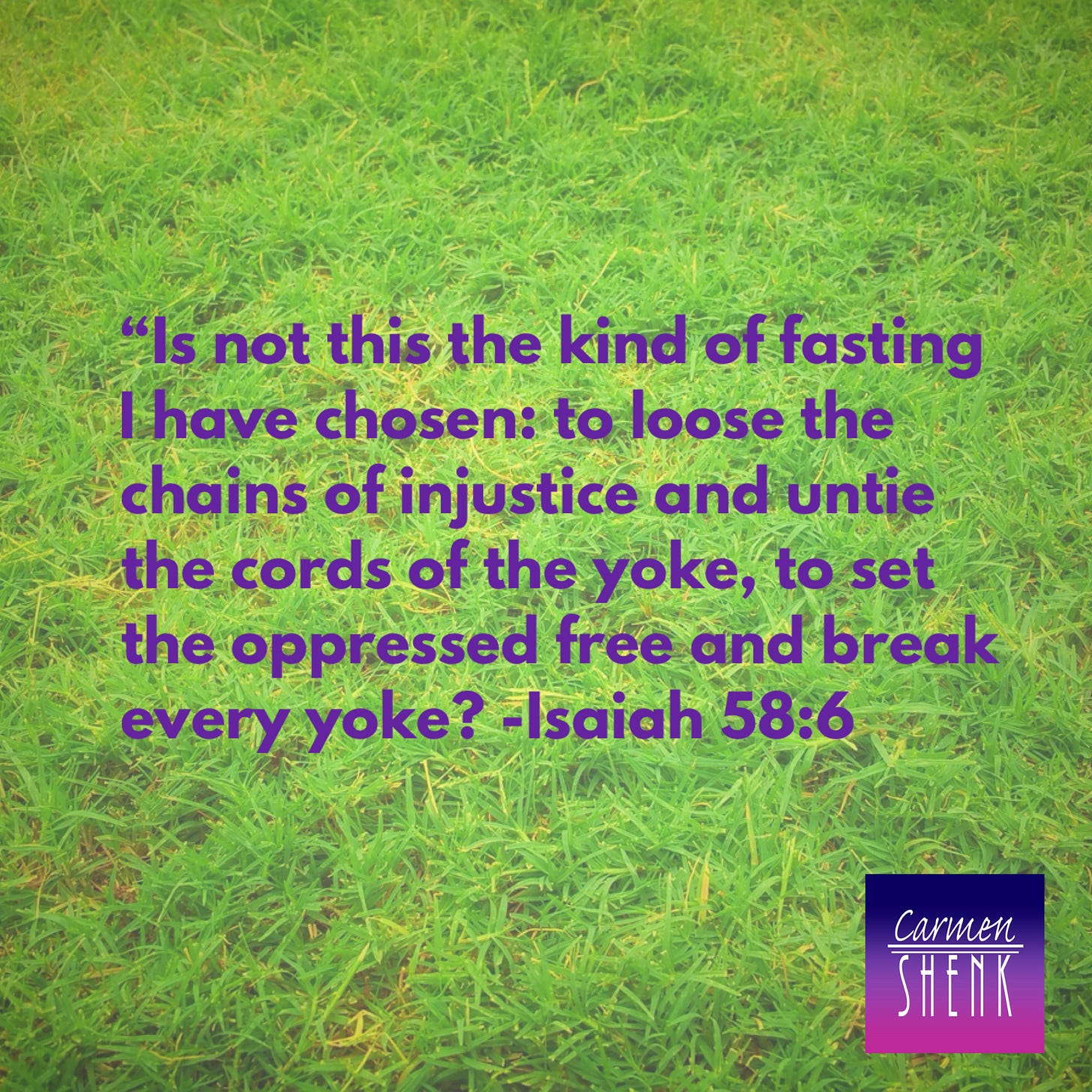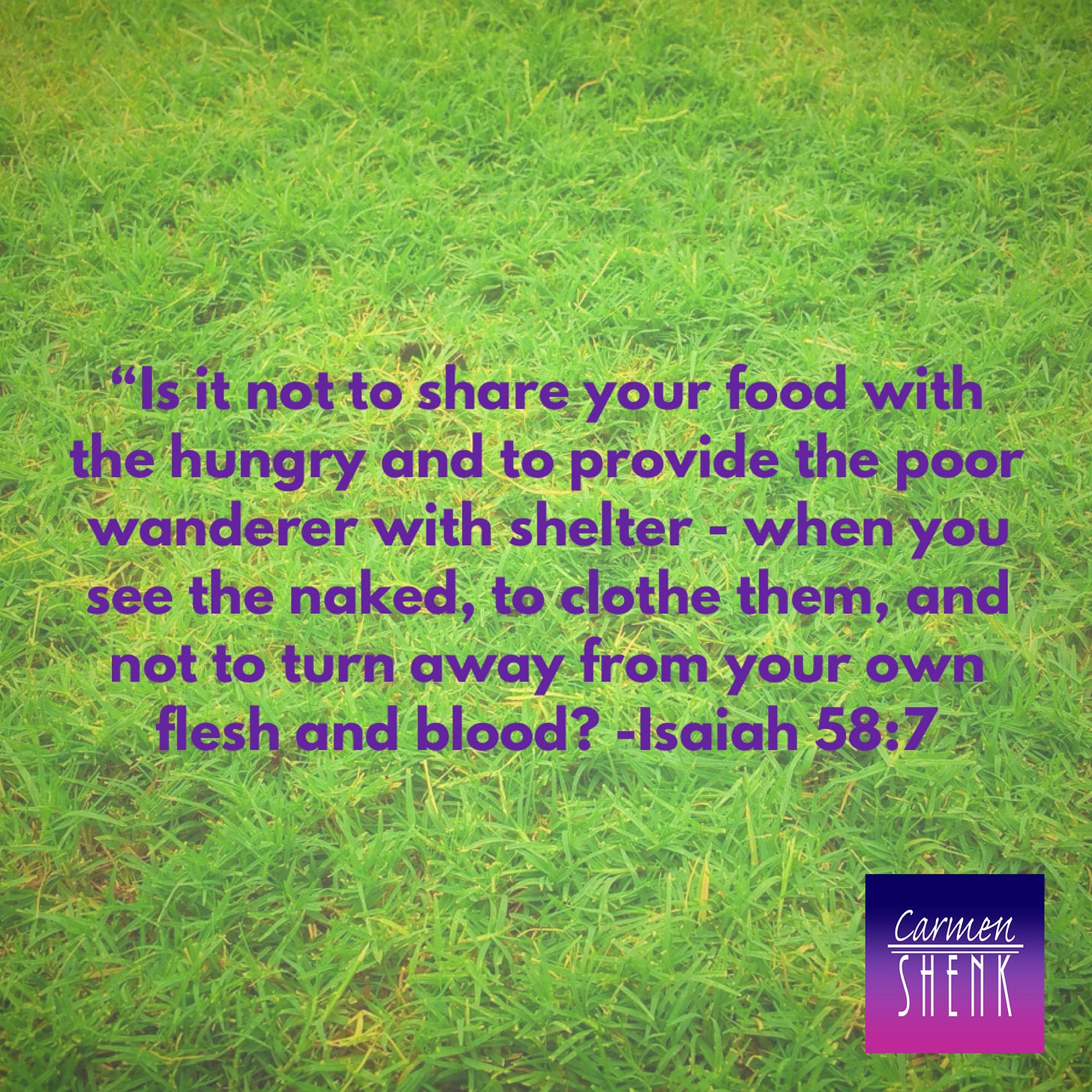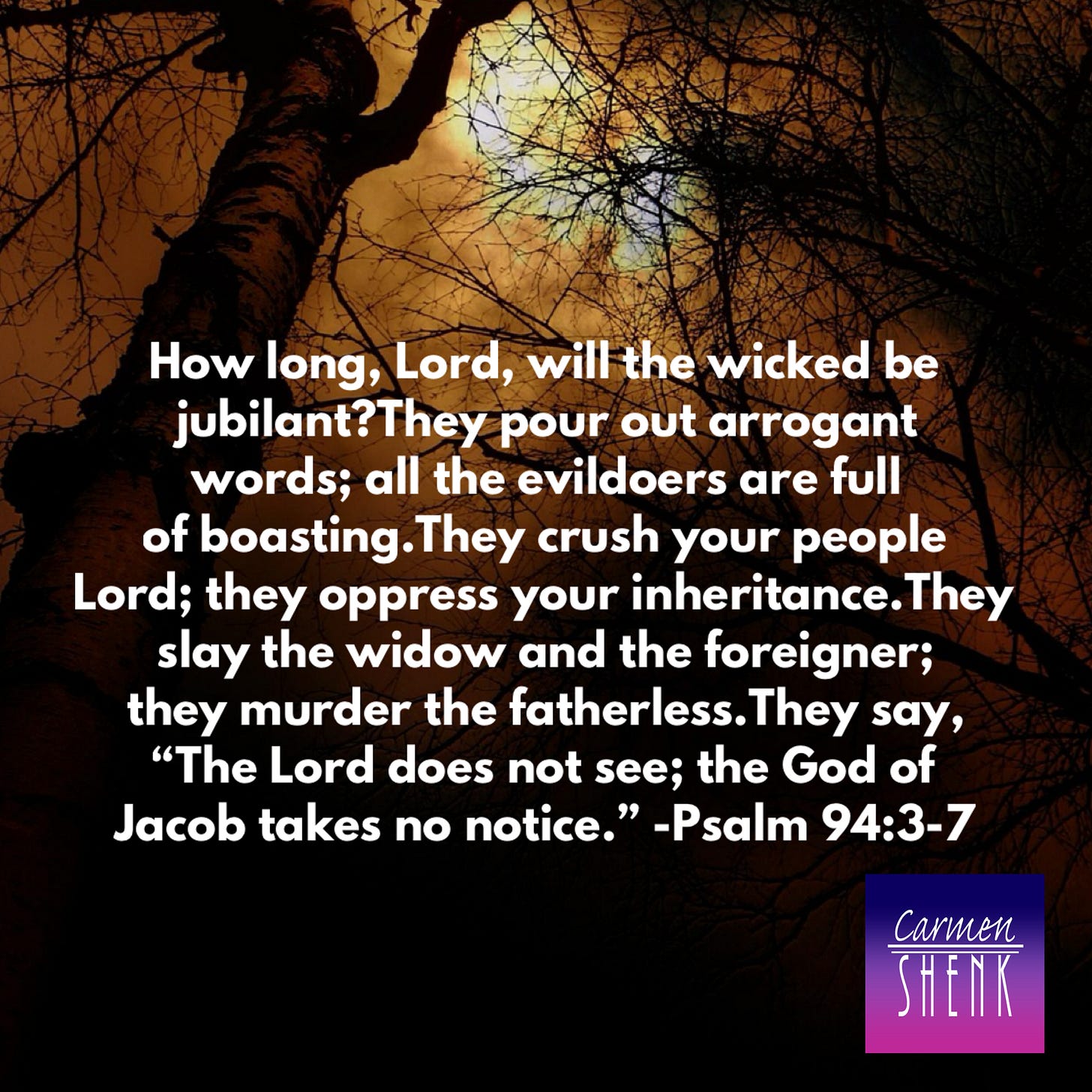Strangers in a Strange Land
God told him, ‘Leave your homeland and kin, and go to the land that I will show you
I just ran across this passage in Acts where it’s talking about Stephen. “Stephen, who stood out among the believers for the way God’s grace was at work in his life and for his exceptional endowment with divine power, was doing great wonders and signs among the people.” And… well, there were religious folks that were not happy that Stephen was so spiritually powerful and popular among the people. So they nabbed him from his place waiting on tables and ministering to the needs of the people, and they dragged him off to the council for a grilling. And they made a bunch of accusations and then just stared at him. Hmmm… sound daunting? Yeah, I thought so also
So here is Stephen’s response:
2 Stephen responded, “Brothers and fathers, listen to me. Our glorious God appeared to our ancestor Abraham while he was still in Mesopotamia, before he settled in Haran. 3 God told him, ‘Leave your homeland and kin, and go to the land that I will show you.’ 4 So Abraham left the land of the Chaldeans and settled in Haran. After Abraham’s father died, God had him resettle in this land where you now live.
Ok, first of all what struck me was the Abraham, father of the faith, was an immigrant. He moved and settled, then God called him to move again.
5 God didn’t give him an inheritance here, not even a square foot of land. However, God did promise to give the land as his possession to him and to his descendants, even though Abraham had no child. 6 God put it this way: His descendants will be strangers in a land that belongs to others, who will enslave them and abuse them for four hundred years.
Oh dear, Abraham’s kids would be immigrants-turned-slaves.
7 And I will condemn the nation they serve as slaves, God said, and afterward they will leave that land and serve me in this place.
God condemns the nation that oppresses their people. And afterward God calls the descendants of Abraham, Isaac and Jacob to immigrate again. Fast forward to Moses visiting his family:
23 “When Moses was 40 years old, he decided to visit his family, the Israelites. 24 He saw one of them being wronged so he came to his rescue and evened the score by killing the Egyptian. 25 He expected his own kin to understand that God was using him to rescue them, but they didn’t. 26 The next day he came upon some Israelites who were caught up in an argument. He tried to make peace between them by saying, ‘You are brothers! Why are you harming each other?’ 27 The one who started the fight against his neighbor pushed Moses aside and said, ‘Who appointed you as our leader and judge? 28 Are you planning to kill me like you killed that Egyptian yesterday?” 29 When Moses heard this, he fled to Midian, where he lived as an immigrant and had two sons.
Moses was indeed called by God as a leader and judge, as this “who do you think you are” guy accuses. That was his calling, but young Moses went about it his own way having no clue God might have something greater for him. That didn’t go too well, and when the news got out of what he’d done by murdering the Egyptian - he knew he needed to get out of Dodge. So “he fled to Midian - where he lived as an immigrant.” He was there long enough to have a couple kids. Verse 30 tells us he was there 40 years, and then he turned a corner and had a burning bush God encounter:
33b Remove the sandals from your feet, for the place where you are standing is holy ground. 34 I have clearly seen the oppression my people have experienced in Egypt, and I have heard their groaning. I have come down to rescue them. Come! I am sending you to Egypt.’
Can we just note for a second that God notices the oppression of his people? I think that’s a good thing to remember.
36 This man (Moses) led them out after he performed wonders and signs in Egypt at the Red Sea and for forty years in the wilderness.
Here’s Moses with this band of brown skinned escaped slaves on his way to the promised land. He’s an immigrant again, and this time he’s got a huge group of people with him. They’re headed for Canaan.
In fact, the text is full of immigrants! God called Abraham to move multiple times. Jacob got in trouble with his brother and had to leave town. The Exodus story of Moses leading Jacob’s family into Canaan was a mass immigration.
Mary, Joseph and Jesus had to flee Herod into Egypt when Jesus was young, they needed asylum.
None of these moves were “legal” to the people who already lived in those places. “Legal” or “illegal “ does not exist in scripture in terms of human beings. Nobody is illegal in the eyes of God.
The descendants of Jacob were immigrants. And God spoke to them about how to treat immigrants who would come to them. Here are some examples:
Deuteronomy 10:19: "Love the foreigner, for you were foreigners in Egypt."
Exodus 22:21: "Do not mistreat a foreigner, for you were foreigners in Egypt."
1 Chronicles 29:15: “For we are strangers before you and sojourners, as all our fathers were.”
Leviticus 19:33-34: “When a stranger sojourns with you in your land, you shall not do him wrong. You shall treat the stranger who sojourns with you as the native among you, and you shall love him as yourself, for you were strangers in the land of Egypt: I am the Lord your God.
Ephesians 2:19-20: So then you are no longer strangers and aliens, but you are fellow citizens with the saints and members of the household of God, built on the foundation of the apostles and prophets, Christ Jesus himself being the cornerstone,
The Old Testament mentions "foreigners" or related terms like "stranger" and "alien" hundreds of times, especially in Leviticus, Deuteronomy, and Exodus. The Israelites are repeatedly taught to treat foreigners with kindness and justice, remembering their own time as foreigners in Egypt when they were forced to become slaves. Egypt serves as a strong reminder and divine instruction to never oppress others, but to treat foreigners with kindness, respect, and justice.
In fact, I think it’s really interesting to note that in Isaiah 58, I hear the tone of a perplexed God. And maybe God is also asking us today how we really expect this to work? At the beginning God talks about how much they seek Him, which sounds good…
2 For day after day they seek me out;
they seem eager to know my ways,
as if they were a nation that does what is right
and has not forsaken the commands of its God.
They ask me for just decisions
and seem eager for God to come near them.
3 ‘Why have we fasted,’ they say,
‘and you have not seen it?
Why have we humbled ourselves,
and you have not noticed?’
And then we get the kicker:
“Yet on the day of your fasting, you do as you please
and exploit all your workers.
4 Your fasting ends in quarreling and strife,
and in striking each other with wicked fists.
You cannot fast as you do today
and expect your voice to be heard on high.
Justice toward others is the foundation of a relationship with God. Here’s God’s challenge in the voice of the prophet Isaiah
It’s been so easy for me to read these words over the years and kind of forget what they really mean. I’ve donated a ton of stuff and done some things here and there. But honestly, I have not always lived a lifestyle of generosity. That is something I’m growing into. It’s not enough for me to just to give mental assent to these ideas. It’s important to also move into obedience.
Despite what you may see in the news, having a soft and open heart toward other people - even people who are not from around here - this is the core of the Jewish and Christian faith. Indeed, this is the core of the entire biblical text, not just the person of Jesus. Sadly, this seems to be missing in main stream Christianity these days. This just disconnects the modern evangelical movement from its roots in the truth of the text. It’s painful to watch, and my heart hurts for those who have been displaced and criminalized for their “crime” of looking for asylum in the US. #weepingwhitewoman
I think history will put this deportation frenzy in the same paragraph as the concentration camps of other periods of history.
I’ll close with these words from Psalm 94:
God does see.
The God of Jacob (whose descendants were enslaved in Egypt) does take notice!
Lord, soften our hearts toward folks who aren’t from around here. Help us to notice when and where we can be helpful. Help us to be kind and accommodating. And please protect our dear ones from being criminalized. Protect them from all harm, and from having their families ripped apart, and from being separated and deported to different places. Please place your compassionate people at every step of their journey to help them find their way to a safe new home. In the name of Jesus who sought asylum in Egypt as a defenseless child. Amen.
Sending love your way,
Carmen
I release you in the power of the Holy Spirit into the world God so loves, to do justice, to love mercy, and to walk humbly with the God, who sees the goodness and grace in you, and walks proudly with you.








